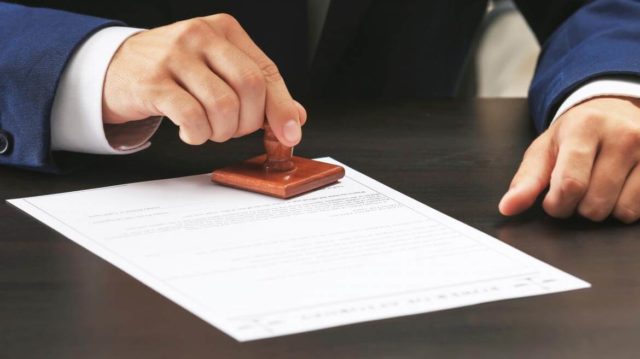What is notarization? Prohibited acts regarding notarization in Vietnam
What is notarization? What are the prohibited acts regarding notarization in Vietnam? – Viet Dung (Dong Nai, Vietnam)

What is notarization? Prohibited acts regarding notarization in Vietnam (Internet image)
1. What is notarization?
According to Clause 1, Article 2 of the Law on Notarization 2014, notarization means the written certification by a notary of a notarial practice organization of the authenticity and lawfulness of a contract or another civil transaction (below referred to as contract or transaction) or of the accuracy, lawfulness and conformity with social ethics of the Vietnamese or foreign-language translation of a paper or document (below referred to as translation) which is prescribed by law or voluntarily requested by an individual or organization to be notarized.
2. Prohibited acts regarding notarization in Vietnam
- Notaries and notarial practice organizations are prohibited from committing the following acts:
+ Disclosing information on the contents of notarized documents, unless notarization requesters so agree in writing or otherwise provided by law; using information on notarized contents to infringe upon lawful rights and interests of individuals and organizations;
+ Notarizing contracts, transactions or translations the purposes and contents of which violate law or are contrary to social ethics; inciting or creating conditions for parties to contracts or transactions to conduct sham transactions or commit other deceitful acts;
+ Notarizing contracts, transactions or translations which are related to properties or interests of their own or of their relatives being spouses; natural parents, adoptive parents; natural parents, adoptive parents of their spouses;
Natural children, adopted children or children-in-law; grandparents, siblings or siblings-in-law; and natural grandchildren, adopted grandchildren;
+ Refusing notarization requests without plausible reasons; harassing or causing difficulties to notarization requesters;
+ Receiving or demanding money or other benefits from notarization requesters in addition to notarization changes, notarization remuneration and other expenses already determined and agreed; receiving or demanding money or other benefits from a third party to settle or refuse to settle notarization requests, causing damage to notarization requesters or related organizations and individuals;
+ Forcing others to use their services; colluding with notarization requesters or related persons to falsify contents of notarized documents or notarization dossiers;
+ Exerting pressure, threatening or committing acts which are illegal or contrary to social ethics in order to gain advantage for themselves or their organizations in notarial practice;
+ Advertising themselves or their organizations in the mass media;
+ A notarial practice organization establishing branches, representative offices or transaction places other than its head office; conducting production, business and service activities outside its registered scope of operation;
+ A notary practicing his/her profession concurrently at two or more notarial practice organizations or performing other regular jobs;
+ A notary participating in the management of an enterprise other than his/her notarial practice organization; providing brokerage or agency services; receiving profits from a contract or transaction which he/she has notarized;
+ Committing violations of law or rules on notarial practice ethics.
- Organizations and individuals are prohibited from committing the following acts:
+ Pretending to be notarization requesters;
+ Notarization requesters providing false information and documents or using counterfeit or illegally erased or modified papers and documents to request notarization;
+ Witnesses or interpreters committing deceitful or dishonest acts;
+ Obstructing notarial activities.
(Article 7 of Vietnam Law on Notarization 2014)
- Key word:
- notarization in Vietnam
- Cases of land rent exemption and reduction under the latest regulations in Vietnam
- Economic infrastructure and social infrastructure system in Thu Duc City, Ho Chi Minh City
- Regulations on ordination with foreign elements in religious organizations in Vietnam
- Increase land compensation prices in Vietnam from January 1, 2026
- Determination of land compensation levels for damage during land requisition process in Vietnam
- Who is permitted to purchase social housing according to latest regulations in Vietnam?
-

- Cases of notarization being conducted outside ...
- 15:07, 19/04/2023
-

- Criteria for notaries in Vietnam under the latest ...
- 18:09, 23/12/2022
-

- Regulations on Notarization of testaments in Vietnam
- 11:06, 13/07/2022
-

- What is notarization? What is the legal validity ...
- 10:51, 11/07/2022
-

- Vietnam: To fully annul 24 administrative procedures ...
- 14:10, 25/06/2021
-

- Notable new policies of Vietnam effective as of ...
- 16:26, 11/04/2025
-
.Medium.png)
- Notable documents of Vietnam in the previous week ...
- 16:21, 11/04/2025
-
.Medium.png)
- Notable documents of Vietnam in the previous week ...
- 16:11, 02/04/2025
-
.Medium.png)
- Notable new policies of Vietnam to be effective ...
- 16:04, 02/04/2025
-
.Medium.png)
- Notable new policies of Vietnam effective from ...
- 14:51, 21/03/2025

 Article table of contents
Article table of contents
